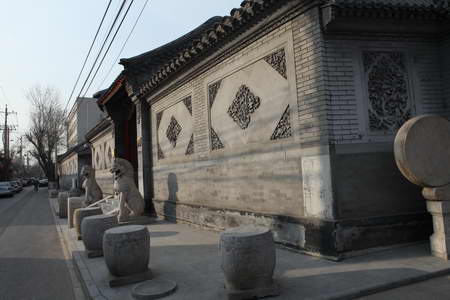Dragons in heaven, donkeys on earth: Lishi Hutong
|
|
|
The location for Dazhaimen. Photo: Guo Yingguang |
If eating dogs and cats is a bit too close to your heart, how's about some donkey meat? An old saying goes, Tian shang long rou, di shang lü rou, or "Dragon meat in heaven, donkey meat on earth". Apparently, this implies that donkey meat is delicious, maybe because, unlike dragons, they are real. It's hard to say.
What we do know is that several hundred years ago, Beijing's twisting lanes included Lüshi (donkey market) Hutong, where wooden poles once lined the street and livestock salesmen shouted while prospective buyers pried open the mouths of donkeys and mules to check their teeth. Veterinarians, leather salesmen and blacksmiths squatted in wait to examine and equip newly purchased animals. These scenes are recorded vividly in a book called Shuntianfuzhi, written in the year 1886 during the Qing Dynasty.
Near the end of the dynasty, Lüshi Hutong's name was changed to Lishi Hutong to sound more civilized, because li means courtesy. This hutong is crammed full of historical residences, as well as donkey meat restaurants, the one remaining legacy of its ungulate-hawking past.
Lishi Hutong is located in southeast Dongcheng District, with Chaoyangmen Nanxiaojie to its east and Dongsi Nandajie to its west. It may seem difficult to imagine that a mere three kilometers from the Forbidden City, a bustling raucous livestock market once existed. Modern day Lishi Hutong is still chaotic, now with junk dealers sorting scraps. Unwise is the driver who tries to bring his car down this lane. Congruous ancient gray buildings line the roadsides, now residences for Lishi locals.
Former residence of Liu Yong
Liu Yong was a poet and official during the Qing Dynasty; two television series are based on his life, and his character is known as one of the most beloved on TV, the others being Ji Xiaolan, a famous Qing civil servant, and He Shen, the most corrupt official. Liu Yong on the telly was better known by his unsubtle nickname, "Liu Luoguoer": luoguoer means hunchback, and that he was, in addition to being quite short.
In spite of its purpose as a market, common people were not allowed to live here in the past. Under privilege granted by the Qianlong emperor, Liu Yong's residence was built in the west part of Lishi Hutong. Nowadays, not much is left but for two yards in the south part. The courtyard serves no specific use, but remains tidy with green paint and red window bars. The north side collapsed during the Tangshan earthquake of 1976 and has been completely replaced by a two-story cement structure. According to historical records, when Liu Yong died, Emperor Qianlong traveled in a sedan chair to his home for the memorial ceremony. However, he couldn't get through the low entrance, which showed Liu Yong's modesty and incorruptibility, for in ancient times a grand gate indicated a rich owner. The emperor had to remove the top of his sedan chair to get into the home. The entrance is still so low that modern day visitors have to bend to pass through.
No. 43
If the west entrance is best known for Liu Yong, then the east is recognized as the former residence for civil servants during the Qing Dynasty. Compared with Liu Yong's reputation, they are unknown to history, but their residence is grander and better maintained. There are two square stones outside the gate, stepping stools for people to mount their horses. The large gate is bookended by two drum-shaped marble stones (mendun). Several connected siheyuan lay beyond the gate.
 0 Comments
0 Comments








Comments